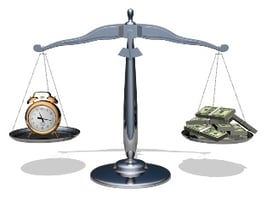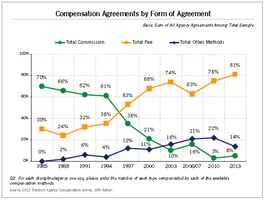With our thanks to Tim Williams from Ignition Consulting Group for this article It surprises most...
Value Based Compensation: Who cares?
We do!!! Value Based Compensation Matters
Please excuse the inflammatory headline, above because I am guessing that a lot of people, including myself are very interested in the opportunity to incorporate metrics of 'value' in agency compensation arrangements.
That is, to consider measures of the value that agencies deliver to their clients, beyond their fee-based services.
Just this morning I received the AAAA SmartBrief and saw a reference to an article published in AdAge earlier this year. (See source article reference, below).
In particular the line "We price ourselves on the subjective theory of value" caught my eye.
Concrete and measurable compensation metrics
A question to those in the finance or purchasing department is this; how likely is it that significant contracts and compensation agreements will be structured around metrics that are purely subjective and quite often intangible?
The answer, of course is that compensation metrics often do not include any subjective measures. I suspect the common finance view is that when it comes to compensation, concrete measures are best.
VBC - Measuring Value
If we look at the time-worn cliche of SMART Objectives (Specific, Measurable, Achievable, Realistic, Time-based), is this an approach we can directly apply to measuring value?
What some would argue is that it is highly likely that there will be a direct correlation between performance and value. They say that in effect performance becomes a surrogate for value, it just doesn't sound as sexy.
"Performance-based compensation vs. Value-based compensation"...they ask is really that much of a difference except in terminology?
However, others (particularly agencies) feel that value has a far deeper role and a longer term horizon (e.g. aligned with building a stronger brand) and short term objectives with their direct measurement often miss this vital contribution.
The 3 Evaluation Dimensions
Looking across our clients, we see them assessing their agencies across a mix of three key dimensions. Some will even use all three dimensions in their agency assessment framework.
- Outcome Measures; e.g. sales volume, market share gain
- Drivers; e.g brand awareness, recall
- Relationship Measures; e.g. creative quality, strategic insights, account service
The Agency Relationship Dimension
You can be sure that most marketers primarily want to assess the fundamental agency relationship. And it is here that the rating will, by necessity, always have a subjective element to it.
It is also worth noting that a recent ANA survey on Client/Agency Relationships confirmed that the "Relationship attributes" are of key importance to clients.
(One issue that we will explore in a future article is that many clients and agencies are finding it hard to define workable measures of value to include in agency assessment programs, which are often used to aid the compensation process.)
So in addition to the pure performance attributes that your CFO loves, it is in the relationship measures, that the intangible but hugely important value-adds (such as great creative or strategic insights) are captured. These can then be combined with the more directly measurable performance criteria and objectives to form a complete picture of the agency's contribution.
Finally then, a balanced compensation model can be built that uses a mix of value and performance. This should satisfy both the desires of the Marketers and the needs of Purchasing/Finance.
Author: Richard Benyon (Decideware)
Exert: Agency Value Creation Center
News, events and advice on agency compensation matters ... "We price ourselves on the subjective theory of value. That allows us to structure more varied, entrepreneurial compensation agreements." These thoughts on value-based pricing excerpted from "Fed-up Agencies Quit Punching the Clock," by Jason DeLand, partner, Anomaly (Advertising Age, January 2007).




